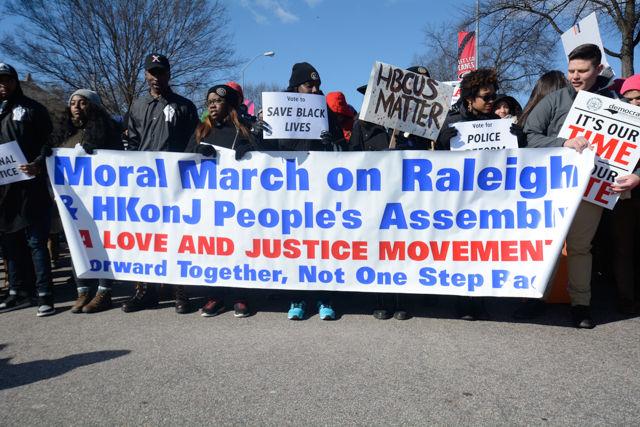
Bryan Murphy
Protesters at the front line of the HKonJ march hold up a sign for the event along with various other signs for different movements on Feb. 13, 2016. The theme of this year's event is to get out the vote and the campaign is being called “This is our Selma, our time, our vote.”
Thousands of people braved freezing temperatures Saturday morning to join the North Carolina chapter of the NAACP to advocate for voting rights and other causes at the 10th annual Moral March on Raleigh and Historic Thousands on Jones Street People’s Assembly.
Speakers and protesters began the march in front of the Duke Energy Center for the Performing Arts and walked with signs and banners to Fayetteville Street for a rally in front of the Capitol building, where the crowd took up an entire city block.
The name of the rally, HKonJ, originates from when protesters used to gather at the legislative building on Jones Street at the end of their demonstrations, but the location of the rally has since been moved to the entrance of the Capitol building on Fayetteville Street.
With the presidential primaries set for next month and new voter ID laws in North Carolina taking effect in this election, speakers at this year’s rally heavily emphasized the importance of voting rights.
Rev. William Barber, the charismatic leader of the Moral March movement and the president of the North Carolina NAACP, criticized a new law that took effect this year that will require anyone participating in an election to bring a state-issued photo ID or fill out a waiver describing why they don’t have one.
Barber argued that it is one of the ways the Republican-controlled state legislature is working to disenfranchise particularly black and low-income voters.
“They have made it easier to get a gun than to vote,” Barber said.
Barber also spoke about a federal court’s decision to require the state legislature to redraw two of North Carolina’s congressional districts, ruling that the districts were based too heavily on race.
The state legislature requested the U.S. Supreme Court allow the districts to stay in place for this year’s election, but they have yet to receive a reprieve. The legislature is holding a set of public hearings today to begin the process of redistricting.
“The fight for voting rights is personal for me,” Barber said. “It’s not a game, it’s not trivial, and it’s a battle that I have had to wage in my lifetime. And it’s a battle we have to wage now.”
Under the new law, student ID cards are not an acceptable form of identification to be used at the polls. Students looking to vote in the upcoming election must have a North Carolina state-issued driver’s license or identification card, a U.S. passport, a military identification card, a veteran’s identification card or an accepted form of tribal identification card.
Several students from universities across the state were among those invited to address the crowd. Kierra Campbell from UNC-Chapel Hill reminded young people in the crowd, particularly young black people, that the fight for right to vote is still an ongoing battle.
“A war has been declared on us,” Campbell said. “It is a war in which our voices must now fight louder than ever before to be heard.”
Fatima Zohra Hedadji, a senior studying interpersonal communication, said although she came to the rally to protest Islamophobia, there is power in students standing in solidarity with other causes.
“I’m here not necessarily for my own identity, but because this is a place where we can all realize that us standing for each other’s causes and each other’s struggles can help us lead more towards a solution than us standing in our own corners focusing on our own problems,” Hedadji said.
Farris Barakat, the brother of Deah Barakat, was also present at the rally protesting Islamophobia. He shared the story of Deah, his wife Yusor Abu-Salha and her sister Razan Abu-Salha’s murder with the crowd for the second year in a row.
Barakat compared their story to the story of Rosa Parks, the famous black civil rights activist who was arrested in 1955 for not giving up her seat on a bus for a white person.
“Today they tell me that Deah, Yusor and Razan were murdered because of an ongoing dispute over a parking space, as if Rosa Parks’ struggle was an ongoing dispute over a bus seat,” Barakat said.
Barakat emphasized the need to reclaim the Muslim American narrative so that more Muslims can feel like they have a rightful place in the United States.
“In Deah, Yusor and Razan, Muslims across the world saw their children and themselves, and in Craig Hicks, they saw the daily encounters of anti-Muslim bigotry and hate,” Barakat said.
Nathaniel Marquard contributed reporting to this article.